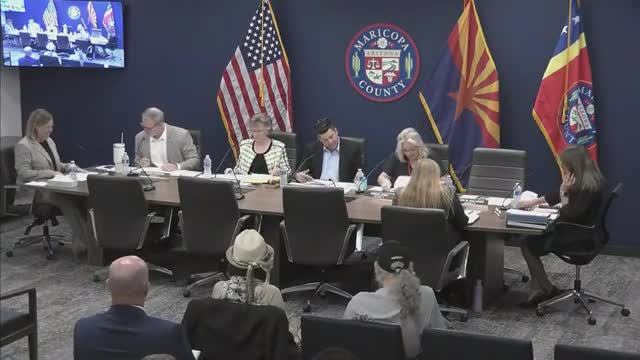Maricopa supervisors accept 40 recommendations to streamline environmental services permitting
Get AI-powered insights, summaries, and transcripts
Subscribe
Summary
The Board of Supervisors voted unanimously to accept an ad hoc task force report that proposes 40 process and technical changes to Maricopa County Environmental Services Department permitting, including clearer guidance, a Permit Center help desk, and reduced duplicative reviews with state and municipal agencies.
The Maricopa County Board of Supervisors on an unanimous vote accepted a report from an ad hoc stakeholder task force recommending 40 changes to processes and standards at the Maricopa County Environmental Services Department to speed permitting and reduce duplicative reviews.
The task force, convened under board direction and chaired by members of two subcommittees, reviewed the department’s water and wastewater treatment and subdivision programs and identified items ranging from customer-service changes in the county’s Permit Center to technical engineering standards and code changes.
Task force members said the recommendations aim to reduce delays tied to unclear requirements, overlapping reviews with the Arizona Department of Environmental Quality (ADEQ), and inconsistent engineering guidance. “We held a kickoff meeting on June 17, and as a result of their effort, 40 recommendations were developed,” Maricopa County Environmental Services Director Andy Linton said during the presentation.
Among the process recommendations are: advance notification of proposed regulatory or permit changes; annual stakeholder meetings; clearer guidance documents for each permit type; a Permit Center help desk and more visible staff contact information; renaming and promoting the permitting services coordinator role so customers can reach a person familiar with applications; and publishing key performance indicators (KPIs) such as initial review times and common deficiencies.
On cross-jurisdictional reviews, the task force recommended that environmental reviews for infrastructure that is Phoenix-owned and wholly within Phoenix right-of-way be deferred to the City of Phoenix — except where codes require county review — to avoid duplicative submittals. Supervisors asked whether deferral would leave the county unable to verify construction; staff said ADEQ standards still apply and right-of-way permits from the county would remain required for work in a county-owned road.
Technical recommendations included: compiling an approved list of allowable design and construction tolerances with MAG (Maricopa Association of Governments) for common elements such as sewer slope; clarifying the AOPP (approval of proposed plan) process and limiting when an AOPP is required versus an ATC (approval to construct) or AOC (approval of construction); and initiating an EROP process to revise county fee schedules and include an updated cost-recovery study every four years.
The task force also identified duplicative reviews for wastewater treatment plant repairs and recommended seeking a regulatory change so county approvals are not required for in-kind rehabilitation or maintenance that do not increase capacity or change discharge points — work that ADEQ already reviews. The presentation noted that Engineering Bulletin 11 (1978) is largely obsolete and recommended forming a stakeholder work group, including ADEQ, to establish current acceptable engineering references and standards.
Board members praised the stakeholder approach and the department’s staff. Following the presentation, a board motion to accept the report and direct staff to proceed with implementation passed with a unanimous vote. The motion directed staff to proceed with implementation of the recommendations as contained in the report.
The presentation materials list the full membership of both subcommittees and indicate work is ongoing on items that require code or rule changes; several recommendations will require follow-up actions such as initiating EROP cases or drafting changes to county health code language.
